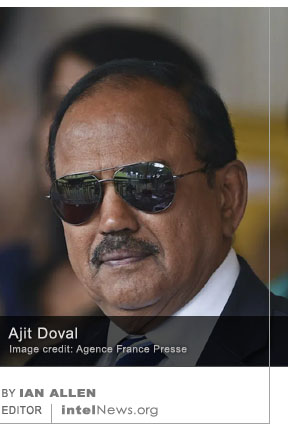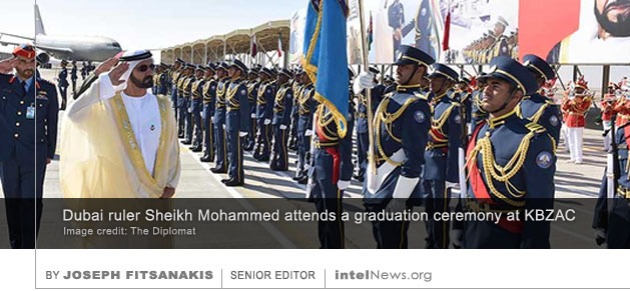United States reaches agreement with ex-NSA staff who helped Emirates hack targets
September 16, 2021 Leave a comment
 Three former employees of American spy agencies, who helped the United Arab Emirates hack targets around the world, including United States citizens, have agreed to cooperate with the investigation into their activities. The US Department of Justice said on Tuesday that it had reached a “deferred prosecution agreement” with the three Americans, Ryan Adams, Marc Baier and Daniel Gericke. At least two of them are believed to have worked for the US National Security Agency before transferring their skills to the private sector.
Three former employees of American spy agencies, who helped the United Arab Emirates hack targets around the world, including United States citizens, have agreed to cooperate with the investigation into their activities. The US Department of Justice said on Tuesday that it had reached a “deferred prosecution agreement” with the three Americans, Ryan Adams, Marc Baier and Daniel Gericke. At least two of them are believed to have worked for the US National Security Agency before transferring their skills to the private sector.
According to US government prosecutors, the three men initially worked for a US-owned private cyber firm, before being hired by another firm that is registered to the UAE, which offered them “significant increases in their salaries”. According to the book This Is How They Tell Me the World Ends, by New York Times reporter Nicole Perlroth, the UAE firm was behind Project RAVEN, a highly intrusive cyber-espionage campaign against domestic and international critics of the UAE monarchy.
As intelNews reported earlier this year, the existence of Project RAVEN was revealed by the Reuters news agency in 2019. Its extensive list of targets included foreign governments, officials of international bodies, as well as lawyers, human rights activists and suspected terrorists. Several of those targets were reportedly American citizens. Perlroth claims in her book that among Project RAVEN’s targets was former First Lady Michelle Obama.
The information released this week by the US Department of Justice details an agreement between the three defendants and the US government, according to which they are required to cooperate fully with the investigation into their activities. They are also required to pay a combined total of nearly $1.7 million to the US government as a form of restitution for violating military export-control standards. Moreover, they are banned from holding security clearances in the future, and are subject to a number of employment restrictions.
Several US news outlets described the agreement between the US government and the three defendants as the first of its kind. Meanwhile, a number of US government officials, including Bryan Vorndran, assistant director of the FBI’s Cyber Division, warned other former US government employees to not violate “export-controlled information for the benefit of a foreign government or a foreign commercial company”.
► Author: Joseph Fitsanakis | Date: 16 September 2021 | Permalink
 MICHELLE OBAMA HAD SOME of her personal emails intercepted by a group of American cyber-spies who were working for the government of the United Arab Emirates (UAE), according to a new book. The book, This Is How They Tell Me the World Ends, is written by Nicole Perlroth, who covers cybersecurity-related topics for The New York Times. It tackles what the author describes as the global “cyber-weapons arms race” and its impact on international security.
MICHELLE OBAMA HAD SOME of her personal emails intercepted by a group of American cyber-spies who were working for the government of the United Arab Emirates (UAE), according to a new book. The book, This Is How They Tell Me the World Ends, is written by Nicole Perlroth, who covers cybersecurity-related topics for The New York Times. It tackles what the author describes as the global “cyber-weapons arms race” and its impact on international security. Intelligence insiders, including a former senior Central Intelligence Agency operations officer who spent decades in the Middle East, have described the establishment of official relations between Israel and some Gulf States as “the biggest change in the region in decades”.
Intelligence insiders, including a former senior Central Intelligence Agency operations officer who spent decades in the Middle East, have described the establishment of official relations between Israel and some Gulf States as “the biggest change in the region in decades”. Israel’s minister of intelligence has said Bahrain and Oman could follow the United Arab Emirates in establishing diplomatic relations with Israel, following last week’s historic announcement. Israel said on Thursday that the UAE had
Israel’s minister of intelligence has said Bahrain and Oman could follow the United Arab Emirates in establishing diplomatic relations with Israel, following last week’s historic announcement. Israel said on Thursday that the UAE had  • In-fighting erupts between Syrian intelligence and army in Damascus. Violent clashes broke out between Syrian regime intelligence forces and local militias affiliated with the army’s 4th Division and national defense in Damascus’ countryside, local media sources reported. Sporadic fighting
• In-fighting erupts between Syrian intelligence and army in Damascus. Violent clashes broke out between Syrian regime intelligence forces and local militias affiliated with the army’s 4th Division and national defense in Damascus’ countryside, local media sources reported. Sporadic fighting  The United Arab Emirates, one of the United States’ closest Arab allies, is training Syrian intelligence and military officers and is giving financial aid to government-owned civilian facilities in Damascus, a report claims. The UAE broke off diplomatic relations with Damascus at the beginning of the Syrian civil war in 2011. But relations between the two countries were restored in 2018, when the oil kingdom reopened its embassy in the Syrian capital.
The United Arab Emirates, one of the United States’ closest Arab allies, is training Syrian intelligence and military officers and is giving financial aid to government-owned civilian facilities in Damascus, a report claims. The UAE broke off diplomatic relations with Damascus at the beginning of the Syrian civil war in 2011. But relations between the two countries were restored in 2018, when the oil kingdom reopened its embassy in the Syrian capital. The United Arab Emirates is behind a “covert air bridge” to supply weapons to Libyan warlord Khalifa Haftar, according to a leaked report by a United Nations investigative panel. A war has been raging in Libya since 2011, when a popular uprising backed by the West and its allies led to the demise of the country’s dictator, Muammar Gaddafi. Much of the east of the country is controlled by the United States-backed Tobruk-led Government, which is affiliated with the Libyan National Army (LNA) and its commander, Field Marshal Khalifa Haftar (pictured). The LNA is fighting against the UN-recognized Libyan Government of National Accord.
The United Arab Emirates is behind a “covert air bridge” to supply weapons to Libyan warlord Khalifa Haftar, according to a leaked report by a United Nations investigative panel. A war has been raging in Libya since 2011, when a popular uprising backed by the West and its allies led to the demise of the country’s dictator, Muammar Gaddafi. Much of the east of the country is controlled by the United States-backed Tobruk-led Government, which is affiliated with the Libyan National Army (LNA) and its commander, Field Marshal Khalifa Haftar (pictured). The LNA is fighting against the UN-recognized Libyan Government of National Accord. The United States Central Intelligence Agency will not collect human intelligence on the United Arab Emirates, even though the oil kingdom’s actions often run directly counter to American interests, according to sources. The CIA’s policy, which some sources described as “highly unusual”, fails to recognize the growing distance between American interests and the UAE’s foreign policies, according to Reuters. The news agency cited “three former CIA officials familiar with the matter” who claimed that the CIA’s policy is out of touch and may be endangering US national security.
The United States Central Intelligence Agency will not collect human intelligence on the United Arab Emirates, even though the oil kingdom’s actions often run directly counter to American interests, according to sources. The CIA’s policy, which some sources described as “highly unusual”, fails to recognize the growing distance between American interests and the UAE’s foreign policies, according to Reuters. The news agency cited “three former CIA officials familiar with the matter” who claimed that the CIA’s policy is out of touch and may be endangering US national security. The French government has admitted that four anti-tank missiles found in a Libyan rebel camp belonged to its Special Forces units, but denied accusations that it deliberately breached the United Nations-imposed weapons embargo on Libya. Libya’s UN-recognized government, the Government of National Accord (GNA), which is headed by Fayez al-Sarraj, announced in June that it discovered a cache of FGM-148 Javelin portable anti-tank missiles during a raid on a rebel camp. The camp belonged to forces loyal to Khalifa Haftar, a rogue Libyan warlord who is supported by a group of Western-led nations that includes the United States, France, Israel, Egypt and the United Arab Emirates.
The French government has admitted that four anti-tank missiles found in a Libyan rebel camp belonged to its Special Forces units, but denied accusations that it deliberately breached the United Nations-imposed weapons embargo on Libya. Libya’s UN-recognized government, the Government of National Accord (GNA), which is headed by Fayez al-Sarraj, announced in June that it discovered a cache of FGM-148 Javelin portable anti-tank missiles during a raid on a rebel camp. The camp belonged to forces loyal to Khalifa Haftar, a rogue Libyan warlord who is supported by a group of Western-led nations that includes the United States, France, Israel, Egypt and the United Arab Emirates. Authorities in the United Arab Emirates said on Sunday that four commercial ships were targeted by “sabotage operations”, but did not point to possible culprits. The announcement came hours after false reports circulated in Iranian and Lebanese media stating that explosions had been witnessed at the port of Fujairah, a major Emirati commercial shipping facility that borders the Sultanate of Oman and is visible from the coast of Iran. The alleged explosions were first
Authorities in the United Arab Emirates said on Sunday that four commercial ships were targeted by “sabotage operations”, but did not point to possible culprits. The announcement came hours after false reports circulated in Iranian and Lebanese media stating that explosions had been witnessed at the port of Fujairah, a major Emirati commercial shipping facility that borders the Sultanate of Oman and is visible from the coast of Iran. The alleged explosions were first  The family of a man who died in a Turkish prison on Sunday while awaiting trial for allegedly spying for the United Arab Emirates has called for an international investigation into this death. Zaki Mubarak Hassan and Samer Shaban —both Palestinians— were reportedly
The family of a man who died in a Turkish prison on Sunday while awaiting trial for allegedly spying for the United Arab Emirates has called for an international investigation into this death. Zaki Mubarak Hassan and Samer Shaban —both Palestinians— were reportedly 
 Weapons supplied to the Saudi and Emirati governments by the United States and other Western nations are ending up in the hands of al-Qaeda-linked Sunni militias in Yemen, according to two separate investigations. The weapons are being supplied to the militaries of Saudi Arabia and the United Arab Emirates by the West on the understanding that they will be used in the war in Yemen. The war has been going on since 2015, when a alliance of rebel groups from Yemen’s Shiite communities formed the Houthi movement, which quickly seized control of much of the country. The Houthis effectively toppled the government, prompting a reaction by a coalition of Sunni Arab states, which see the Shiite movement as an Iranian front. In an effort to restore Yemen’s Sunni-dominated government, Western countries have supplied Saudi Arabia and the United Arab Emirates with more than $5 billion-worth of weaponry.
Weapons supplied to the Saudi and Emirati governments by the United States and other Western nations are ending up in the hands of al-Qaeda-linked Sunni militias in Yemen, according to two separate investigations. The weapons are being supplied to the militaries of Saudi Arabia and the United Arab Emirates by the West on the understanding that they will be used in the war in Yemen. The war has been going on since 2015, when a alliance of rebel groups from Yemen’s Shiite communities formed the Houthi movement, which quickly seized control of much of the country. The Houthis effectively toppled the government, prompting a reaction by a coalition of Sunni Arab states, which see the Shiite movement as an Iranian front. In an effort to restore Yemen’s Sunni-dominated government, Western countries have supplied Saudi Arabia and the United Arab Emirates with more than $5 billion-worth of weaponry. A member of one of the United Arab Emirates’ seven royal families has defected to Qatar and asked for political asylum, in what appears to be the first time that an Emirati royal has publicly turned against the oil-rich kingdom. In May of last year, the UAE
A member of one of the United Arab Emirates’ seven royal families has defected to Qatar and asked for political asylum, in what appears to be the first time that an Emirati royal has publicly turned against the oil-rich kingdom. In May of last year, the UAE  A lengthy exposé by a leading American newsmagazine has claimed that Israel and the United Arab Emirates, two countries that officially have no relations, have been secretly collaborating for more than two decades. Their secret cooperation has been extremely tight and has included clandestine weapons sales and intelligence-sharing, according to the exposé, which was published on the website of The New Yorker on Monday and will feature in the magazine’s print edition on June 18. The lengthy piece, which deals with the changing geopolitics of the Middle East, is written by Adam Entous, national security correspondent for The Washington Post, who has previously reported for more than two decades for Reuters and The Wall Street Journal.
A lengthy exposé by a leading American newsmagazine has claimed that Israel and the United Arab Emirates, two countries that officially have no relations, have been secretly collaborating for more than two decades. Their secret cooperation has been extremely tight and has included clandestine weapons sales and intelligence-sharing, according to the exposé, which was published on the website of The New Yorker on Monday and will feature in the magazine’s print edition on June 18. The lengthy piece, which deals with the changing geopolitics of the Middle East, is written by Adam Entous, national security correspondent for The Washington Post, who has previously reported for more than two decades for Reuters and The Wall Street Journal.





